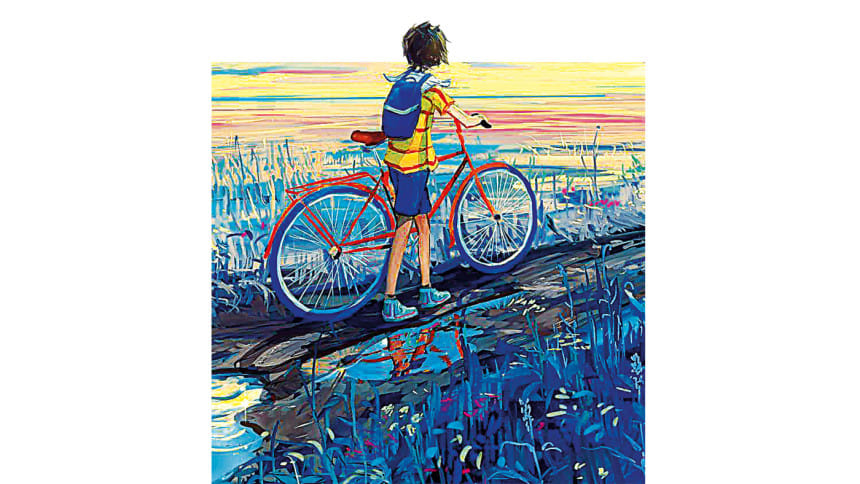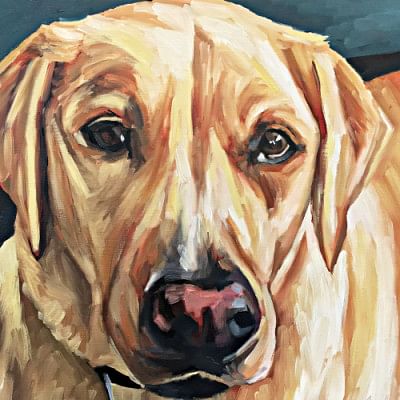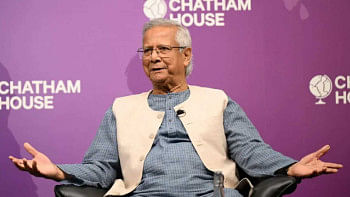My Childhood World

I was thrilled with my success. I had finally proved my deeply held belief – I do possess free will – correct. But then I regretted my action. I am stupid, I thought. I had lost my hard-earned guava for nothing.
Prologue
The best part of my childhood was during the late fifties, attending Dacca Cantonment Primary School at Ayub Line. My father was in the army, and we lived at the Kurmitola military compound. There was a parade ground sandwiched between the army barracks and the family quarters. Besides military parades, the ground had other useful purposes: sports and variety shows for the military personnel and their families.
We lived next to the parade ground. Not only could we run and play there, but the open field offered an unrestricted view of the army barracks. We also enjoyed watching the military parades and the marching band.
Even more exciting was the no-man's land – we called it a jungle – bordering the Dacca–Chittagong railway line that ran past the cantonment. The jungle was full of bushes and trees. Our main attraction was the fruit trees, mostly guava, mango, and jackfruit. We also loved chasing the rabbits and aiming at birds with slingshots. So, beyond home and school, our happy, exciting days revolved around the parade ground and our adventures in the no-man's-land.

My World
Monsoon rains always brought me joy. I would lie on my bed idle and enjoy listening to the pounding rim-jhim on our tin-roofed house. I would also create music by covering and uncovering my ears with my palms in a fast, rhythmic cycle. I would watch through the window as the soft breeze created endless ripples in the vast expanse of shallow water on the inundated parade ground.
When the rain stopped – or sometimes even during the rain – we brothers would go out and run in the submerged grassland, but not without risking Mother's reprimands.
I was curious those days: where does the rainwater fall from? After my initial struggle, I managed to crack the puzzle: the sky must be full of punched holes. Allah in heaven orders the angels to turn on the water taps to allow water to drip down on the earth. There must be separate enclosed areas so that Allah can decide to send rain to some places while keeping it sunny in other areas. It made a lot of sense to me, and I was happy with my intellectual feat in solving the problem.
But then I also had a deeper curiosity: do I have free will? I was sure that I did, so I must find proof to establish it once and for all. Occasionally, I would run thought experiments – I do not remember the details – but was disappointed that none of the experiments proved for certain that I possessed free will.
Then one day, a few friends and I while venturing in the jungle came across a guava tree. We did not waste time. Like monkeys, we climbed up the branches and spread out looking for ripe, ready-to-eat fruits. I caught sight of an unusually large, perfectly ripe guava towards the end of the branch. Getting to it would be risky – a fear of falling to the ground assailed me, but the promise of the reward was stronger. I managed to reach the fruit, grabbed it, and then quickly came down to the ground to enjoy it.
A thought flashed through my mind as I was about to bite the guava and savour it in my saliva-filled mouth. I gathered my strength and threw the guava away into the bush as far as I could.
I was thrilled with my success. I had finally proved my deeply held belief – I do possess free will – correct. But then I regretted my action. I am stupid, I thought. I had lost my hard-earned guava for nothing. How could I be sure that I was not fated to believe in free will and run experiments to prove myself right? How could I know that Allah was not driving my life, just as He decided when and where it would rain?
While my deeper curiosity remained unresolved, I was successful in shaping my world in a different way.
There was a lanky, stray dog in our neighbourhood. Occasionally I would offer him leftover food. In return he started guarding our door and wagging his tail as an expression of his gratitude.
While the monsoon season brought me joy, the dog's suffering troubled me. Soaked in rainwater, shivering with cold, he would take shelter underneath the leafy banyan tree behind our house. Some evenings I would sneak the dog in and allow him to rest in the dark corner of our veranda, but not without my intrinsic feelings of guilt for the deceit.
It has always been an age-old belief that, unlike cats, dogs are unclean animals and therefore not allowed inside a household. It bothered me as to why an innocent, obedient, and faithful animal was considered unclean.
My mother's family came from Bikrampur (presently Munshiganj). It was (and still is) a historic region in Bengal with more than 2,500 years of Hindu antiquity and early Buddhist scholarship during the Emperor Ashoka's period (269 BC to 232 BC). One can still see the remnants of ancient Hindu and Buddhist temples in the area.
During holiday seasons we used to visit our maternal uncle, Hashem mama, and his family residing in the nana's old house. I remember one particular occasion during our visits when Hashem mama took us to the Durga puja mela. There was a variety of shops. One particular shop was selling handmade pottery: coloured decorative pieces and vases; pots and pitchers; statues of Maa Kali, Ganesh, and the Buddha; and toys of all kinds, including dolls and miniature animal figures (tigers, elephants, crocodiles, and even cobras). I stood there motionless, looking at the clay art and sculptures. And then in a lightning flash, I saw the heavenly light shining on earth.
Allah in heaven must have first created men and animals in different shapes and forms according to His own will and then, like filling empty pots and pitchers with water, He poured life into them all before placing them on earth. So, the dog and I must share the same life. Why would only one of us be "unclean" or even "inferior"?
When we got back home, in no time the dog and I became friends. I would call him Bondhu (the Bengali word for friend). At my request, my mother allowed him to use our veranda as his refuge during the hot summer days, the rainy season, and cold evenings. Unfortunately, before his time, he fell gravely ill. For the first time, we carried him inside the house so that we could closely monitor his health. He died shortly thereafter.
The dog went from being "unclean" to becoming a member of our family. We took some comfort in being able to care for him during his last days and grieved his passing. I realised that the lanky, stray dog came to me not only as a friend, but also as a messenger from heaven.
Epilogue
More than sixty years have passed since that momentous revelation. My life's pleasures have now been reduced to leisurely walks in the neighbourhood park, holding my grandson Himaloy's soft little warm hand. His curious mind beholds the wondrous world around him. He asks me about the flying birds, falling rain, and endless other things. I reminiscence about my childhood world and share it with him.
Tohon is a short-story writer. He contributes regularly to the Star Literature page. He is the author of Emil Joseph Burcik (2021), Life's Invisible Battles (2020), The Jihadi (2016) and The Landscape of a Mind (2015).

 For all latest news, follow The Daily Star's Google News channel.
For all latest news, follow The Daily Star's Google News channel. 



Comments